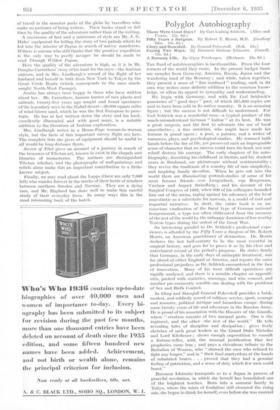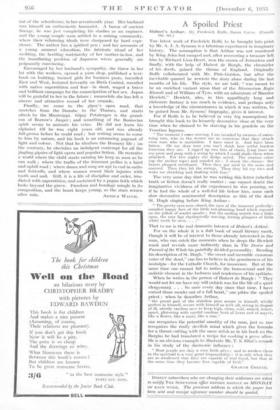Polyglot Autobiography Fifty Years a Surgeon. By Robert T. Morris,
M.D. (Geoffrey A Romany Life. By Gipsy Potulengro. (Methuen. 10s. Bd.).
THE flood of autobiographies is inexhaustible. From the four corners of the world they come. In the present budget there are samples from Germany, America, Russia, Japan and the wandering road of the Romany ; and while, taken together, they present a mass of " fine confused " reading, each in its own way makes some definite addition to the common know- ledge, or offers its appeal to sympathy and understanding. We begin with Germany, and with Dr. Carl Schleich's panorama of " good days " past, of which 305,000 copies are said to have been sold in its native country. It is an amazing figure ; but the success is not difficult to understand. For Carl Schleich was a wonderful man—a typical product of the much-misunderstood German " kultur " at its best. He was a great surgeon, and the first to advocate the use of local anaesthetics ; a fine musician, who might have made his fortune in grand opera ; a poet, a painter, and a writer! of romances, plays, and psychological studies. He warmed bath hands before the fire of life, yet preserved such an impregnable sense of character that no success could turn his head, nor any rebuff destroy his courage. The early chapters of his auto- biography, describing his childhood in Stettin, and his student years in Stralsund, are picturesque without sentimentality they revive the traditions of a country life of rare simplicity, and inspiring family devotion. When he gets out into the world there are illuminating portrait-studies of some of his' most famous friends—von Langenbeek, von Bergmainn, Virchow and August Strindberg ; and his account of the Surgical Congress of 1892, when 800 of his colleagues hounded him out of the arena, raging against his advocacy of the Ideal anaesthetic as a substitute for narcosis, is a model of cool and impartial narrative. In short, the entire book is an un- conscious vindication of :the finest type of German national temperament, a type too often obliterated from the memory, . of the rest of the world by the unhappy dominion of less worthy. Teuton types during the ordeal of the Great War.
An interesting parallel to Dr. Schicich's professional expe- riences is afforded by the Fifty Years a Surgeon of Dr. Robert Morris, an American practitioner of distinction. Dr. Morris declares the last half-century to be the most eventful in surgiCal history, and goes far to prove it so by his clear and untechnieal record of the period's progress. He states 11rMly: that Germany, in the early days of antiseptic treatment, was far ahead of either England or America, and reports the same professional prejudices as Dr. Schield' encountered in the face of innovation. Many of his most difficult operations are rapidly analysed, and there is a notable chapter on appeadi- eitis, packed with statistics, warnings, and wise counsel, and another pre-eminently sensible one dealing with the problems • of Sex and Birth Control.
In Glory and hownfall General Polovstoff provides a brisk, modest, and soldierly record of military service, sport, courage and resource, political intrigue and hazardous escape, during some twenty years of life and adventure in the Russian Army. He is proud of his association with the Hussars of the GuardS, where " creation consists of two unequal parts. One is the regiment, and the other—the rest of the world." He tells revealing tales of discipline and dissipation ; gives lively.
sketches of such great leaders as the Grand Duke Nicholas and Lord Kitchener ; shows enough superstition to consult a fortune-teller, with . the unusual justification that her prophecies came true ; and pays a chivalrous tribute to the Battalion of Women, who " shamed the men who refused to fight any longer," and in " their final martyrdom at the hands of infuriated brutes . . . proved that they had a genuine feeling of patriotism, and a sense of duty which few men could boast."
Baroness Ishimoto transports us to a Japan in process of peaceful revolution, in which she herself has brandished one of the brightest torches. Born into a samurai family in Tokyo, where the mists of feudalism still obscured the rising still, she began to think for herself, even before she was married out of the schoolroom, in her seventeenth year; Her husband was himself an enthusiastic humanist. A baron of ancient lineage, he was just completing his studies as an engineer, and the young -couple soon settled in a mining community, where their • reforming ideals Were sharpened by hard expe- rience. The author has a spirited pen and her accounts Of a young samurai education, the Intricate ritual of her wedding, the beetling matriarchy of her mother-in-law, and the humiliating position of Japanese wives generally are poignantly convincing.
Encouraged by her husband's sympathy, she threw in her lot with the workers, opened a yarn shop, published a text- book on knitting, trained girls for business posts, travelled East and West, lectured fervently on Birth Control, wrestled • with native superstition and fear—in short, waged a brave and brilliant campaign for the emancipation of her sex. Japan will be grateful to her in the future ; meanwhile she has left a sincere and attractive record of her crusade.
Finally, we come to • the gipsy's open road, that stretches from the Danube to the Thames, and starts afresh by the Mississippi. Gipsy Petulengro is the grand- son of Borrow's Jasper ; and something of the Borrovian spirit seems to animate his veins. He did not learn his alphabet till he was eight years old, and was already full-grown before he could read ; but writing seems to come to him by nature, and his book is an entrancing pageant of light and colour. Not that he idealises the Romany life ; on the contrary, he cherishes an indulgent contempt for all the jingling gipsies of light opera and popular fiction. He recreates a world where the child starts earning his keep as soon as .he can walk ; where the traffic of the itinerant pedlar is a hard and uphill road ; where dance and song are apt to end in oaths and fisticuffs, and where women resent their injuries with tooth and nail. Still, it is a life of discipline and order, irra- diated with superstition, and sustained by a pagan faith which looks beyond the grave. Freedom and bondage mingle in its composition, and the heart keeps young, as the stars return













































 Previous page
Previous page